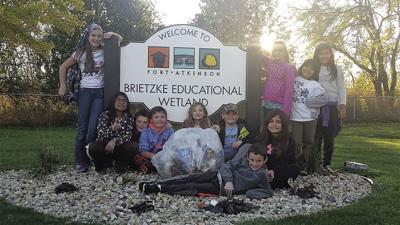
The Wisconsin Department of Natural Resources is recognizing 10 recycling programs from a mix of businesses, schools, nonprofits and local governments with the 2019 Wisconsin Recycling Excellence Awards.
In honor of America Recycles Day on Nov. 15, the DNR is recognizing four entities for “overall operations of a recycling program,” four entities for “special projects and initiatives” and two entities for program “innovation.”
“It is exciting to see communities and businesses find new ways to reduce waste and recycle,” DNR Waste and Materials Management Program Director Joe Van Rossum said. “We want to promote these efforts and share how we divert materials from landfills in Wisconsin.”
The
Overall Program Awards recognize efforts that are robust and continually improving while demonstrating a commitment to improving the overall recycling or diversion program.
- 7 Rivers Recycling in Onalaska developed methods to enable the recycling of old mattresses. 7RR deconstructs the mattresses primarily for the steel, foam and wood. The company smelts the steel for other steel products, makes the foam into carpet backings and grinds the wood into wood mulch for a variety of uses. The company estimates they will recycle more than 12,000 mattresses this year.
- The Purdy Elementary School Green Team in Fort Atkinson is made up of teachers and students in fourth and fifth grades. They are working hard to reduce waste from their school destined for the landfill. While caring for nearby Brietzke Educational Wetland, they recycle trash and compost organic materials. They are also working on ending the single-use plastic problem, recycling milk cartons and many other classroom initiatives.
- The city of New Richmond went through a comprehensive update of its residential recycling services, which the city had not revisited since 1996. In 2018, the city began roundtable discussions with recycling contractors and utilized an online and paper survey to solicit input from the community. The analysis led to a conversion to automated single-stream recycling. The city also works with TerraCycle to recycle cigarette filters in its downtown district.
- University of Wisconsin-Stevens Point has a long history of waste reduction, recycling and sustainability. UWSP was the first UW campus to have recycling chutes in all residential buildings and offer composting in every academic building on campus. The school also vermicomposts--using worms to digest food waste and produce nutrient-rich castings, which are spread as a soil supplement on campus gardens. Other waste diversion initiatives include a student-run food pantry, elimination of plastic straws and the University Surplus reuse program.
Projects and Initiatives Awards recognize specific projects that increase materials recycled or diverted through a particular action or project.
- Aldo Leopold Elementary School in Madison created and maintains a waste reduction and recycling program in their cafeteria that focuses on easy waste reduction techniques to divert waste and promote sustainability. By merely educating students on how and why to recycle milk cartons and sort and stack the food trays, lunch waste volume has been reduced by about 75%.
- Alliant Energy developed a waste management and recycling program for its construction of the West Riverside Energy Center (WREC) near Beloit. The program manages tons of materials generated during construction at the 90-acre project site and includes an active training component and collaboration with local organizations. As of July 2019, their data shows that 87% of waste generated from the WREC project site has been diverted from the landfill.
- Digital Bridge, a Milwaukee-based nonprofit, collects and refurbishes business computers and redistributes the devices to low-income individuals and nonprofits. The company has redistributed over 1,000 computers. Digital Bridge is providing access to affordable technology as well as setting up computer labs for communities that need them.
- Edgar School District science teachers from the middle and high schools created a step-by-step plan to enhance their recycling program. Working with administration and maintenance, the number and sizes of recycling bins were evaluated and increased. Staff also focused on better placement of the recycling containers for easier access and proper use. The district put training in place and adopted a goal of an effective district-wide program that “reduces, reuses and recycles while minimizing the footprint our community leaves.”
 The Wisconsin Department of Natural Resources is recognizing 10 recycling programs from a mix of businesses, schools, nonprofits and local governments with the 2019 Wisconsin Recycling Excellence Awards.
In honor of America Recycles Day on Nov. 15, the DNR is recognizing four entities for “overall operations of a recycling program,” four entities for “special projects and initiatives” and two entities for program “innovation.”
“It is exciting to see communities and businesses find new ways to reduce waste and recycle,” DNR Waste and Materials Management Program Director Joe Van Rossum said. “We want to promote these efforts and share how we divert materials from landfills in Wisconsin.”
The Overall Program Awards recognize efforts that are robust and continually improving while demonstrating a commitment to improving the overall recycling or diversion program.
The Wisconsin Department of Natural Resources is recognizing 10 recycling programs from a mix of businesses, schools, nonprofits and local governments with the 2019 Wisconsin Recycling Excellence Awards.
In honor of America Recycles Day on Nov. 15, the DNR is recognizing four entities for “overall operations of a recycling program,” four entities for “special projects and initiatives” and two entities for program “innovation.”
“It is exciting to see communities and businesses find new ways to reduce waste and recycle,” DNR Waste and Materials Management Program Director Joe Van Rossum said. “We want to promote these efforts and share how we divert materials from landfills in Wisconsin.”
The Overall Program Awards recognize efforts that are robust and continually improving while demonstrating a commitment to improving the overall recycling or diversion program.
